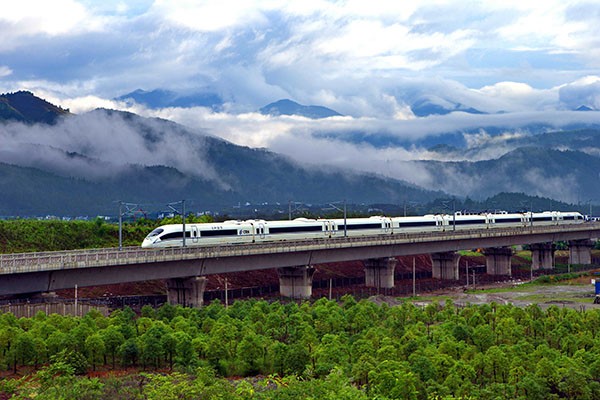High-speed rail tours are quickly becoming popular with travelers, especially families and students during the peak summer season, as China's growing railway network links the country's scenic spots together.
According to latest survey conducted by Chinese online travel agency Tuniu.com, nearly 80 percent of respondents said that they are planning to travel by rail. The majority of the respondents consisted of students, parents and teachers.
Another online travel service provider, Ctrip, said that the number of tourists booking high-speed rail tours on the Hefei-Fujian high-speed railway has increased since it began operations in June.
Dubbed as China's "most beautiful high-speed railway," the Hefei-Fujian high-speed railway runs through Anhui, Jiangxi and Fujian provinces, connecting popular tourist spots such as Mount Huangshan in Anhui, the picturesque ancient county of Wuyuan, and Wuyi Mountain in Fujian.
"Since July, the number of tourists visiting Wuyi Mountain and Xiamen [are] more than double in the last year," said Yan Xin, a PR staff at Ctrip. "To meet the growing demand of tourists attracted by the railway, we have introduced 52 travel routes for group and individual travelers."
Local railway departments have also started to introduce rail tours. In June, Beijing announced it will operate three special rail tours to take tourists from the capital to China's northwest and northeast regions to an 11-day journey in July and August. All three trains contain four-sleeper private cabins and costs up to 4,580 yuan ($737) per person.
"High-speed rail is more convenient and cheaper than flights and regular trains, which has attracted those who didn't think about travel before," said Yan. "For the same travel route, groups using high-speed rail are about 30 percent cheaper than groups on flights."
Yan added that tourism officials and scenic spots along the railway are now also offering discounts to visitors.
Wei Xiao'an, secretary-general of the China Tourism Leisure Association, said that transportation hindered the growth of tourism in the past.
"Back in the 1980s, we had limited trains and limited tickets, so the number of tickets kind of decided the number of tourists," Wei said.
"Now, railways have brought more opportunities and also challenges," he added. "Because the travel hours are shortened, many visitors will not stay as long as they stayed before. And this means local travel service providers need to figure out how to improve their products, not only to attract tourists but also to keep them."



























